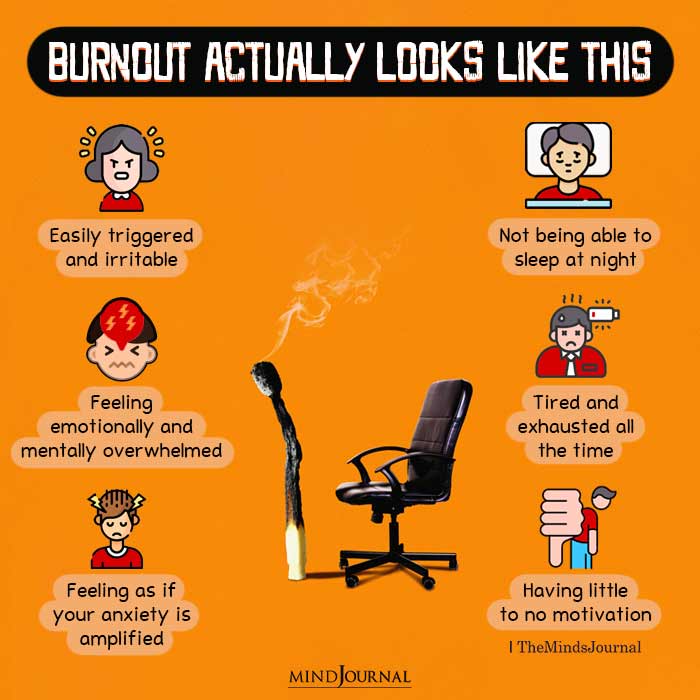Have you ever found yourself physically present but mentally absent? You go through the motions, but your mind seems to have wandered off to another universe. Do you often disengage and mentally check out?
Being emotionally checked out of life can occur in various aspects of our lives, whether at work, in relationships, or during everyday activities.
Today, we will explore what does it mean to be mentally checked out, its potential consequences, and most importantly, how to stop being mentally checked out and regain focus and engagement.
What Does It Mean to be Mentally Checked Out?
Being mentally checked out refers to a mental state where our minds are disengaged from the present moment. It’s as if we’re on autopilot, merely going through the motions without truly experiencing or connecting with our surroundings.

This disconnection often manifests as a lack of focus, reduced motivation, and a diminished sense of purpose. To better understand what does it mean to be mentally checked out, let’s take a look at the following –
1. At Work
Many of us have experienced mentally checking out at work. It can occur due to various reasons like burnout, boredom, or feeling unchallenged in our roles.
When we mentally check out at our jobs, we become less productive and creative, and our overall job satisfaction declines. We may find ourselves constantly daydreaming, procrastinating, or seeking distractions to escape the monotony.
Related: The 12 Stages Of Burnout: From Irritability To Exhaustion
2. In Relationships
Mental checkouts can also affect our personal relationships. When we’re mentally absent during conversations with loved ones, they may feel unheard and unimportant. It can lead to misunderstandings, a lack of emotional connection, and a gradual erosion of the bond we share.
Being present and engaged in our relationships is crucial for fostering deeper connections and nurturing the love and support we receive from our loved ones.
3. During Everyday Activities
Even in our day-to-day activities, we may mentally check out. For example, while performing routine tasks like cooking, cleaning, or commuting, our minds may wander off to worries, concerns, or other distractions.
This detachment from being emotionally checked out of life prevents us from fully experiencing the present moment and finding joy in the simple pleasures of life.
Now that we know what does it mean to be mentally checked out, let’s understand how it can affect us.
What are the Consequences of Being Mentally Checked Out?
When you mentally check out continuously, it can have significant consequences on our well-being and overall quality of life. Some of these consequences include:
1. Reduced Productivity
When we’re mentally absent, our ability to focus and complete tasks efficiently diminishes. This can lead to decreased productivity, missed deadlines, and a decline in the quality of our work.
2. Strained Relationships
Lack of engagement and presence in relationships can create barriers to effective communication, emotional connection, and understanding. Over time, this can strain relationships with family, friends, and colleagues.
3. Missed Opportunities
Mentally checking out prevents us from recognizing and seizing opportunities that come our way. We may overlook chances for personal growth, career advancement, or even meaningful experiences.
4. Emotional Disconnect
By disconnecting from the present moment, we miss out on the full spectrum of emotions. Joy, excitement, and contentment become elusive, and we may find ourselves feeling numb or unfulfilled.
Related: What Is Urgency Culture? How Its Driving You To Burnout?

16 Tips On How to Stop Being Mentally Checked Out
Breaking free from the cycle of mental checkouts requires conscious effort and a commitment to re-engage with life. Here are some practical strategies to help you regain focus and presence:
1. Cultivate Mindfulness
Mindfulness is the practice of being fully present and aware of the current moment. It involves observing your thoughts, feelings, and sensations without judgment. By incorporating mindfulness into your daily routine, you can train your mind to stay focused and stop yourself from being emotionally checked out of life
Simple mindfulness exercises like deep breathing, meditation, or body scans can help anchor you to the present and enhance your overall awareness.
2. Set Clear Goals
Having clear goals and intentions provides a sense of purpose and direction. When you have a clear vision of what you want to achieve, it becomes easier to stay engaged and motivated.
Break down your goals into actionable steps and prioritize them. This way, you can focus your energy and attention on tasks that align with your objectives, reducing the chances of mental checkouts.
3. Create Meaningful Connections
Nurturing meaningful connections with the people around you can greatly enhance your engagement and overall satisfaction in life. Actively listen to others during conversations, show genuine interest, and make an effort to understand their perspectives.
By fostering authentic connections, you’ll find yourself naturally more present and invested in the interactions.
4. Practice Self-Care
Taking care of your physical and mental well-being is essential for combating mental checkouts. Prioritize self-care activities that rejuvenate and refresh you, such as exercise, adequate sleep, healthy eating, and engaging in hobbies you enjoy.
By nurturing yourself, you’ll create a solid foundation for being more present and engaged in all aspects of your life. This is how to stop being mentally checked out.
5. Embrace Novelty
Engaging in new experiences and learning opportunities can reignite your curiosity and prevent mental stagnation. Seek out activities that challenge you intellectually or creatively.
Explore new hobbies, read different genres of books, travel to unfamiliar places, or engage in conversations with people from diverse backgrounds. Embracing novelty stimulates your mind and keeps you actively engaged in the present moment.
6. Practice Gratitude
Cultivating a mindset of gratitude can shift your focus from what’s lacking to what you already have. Take a few moments each day to reflect on the things you’re grateful for, whether it’s a supportive friend, a beautiful sunset, or a personal achievement.
This practice helps you appreciate the present moment and fosters a sense of contentment, reducing the tendency to mentally check out.
Related: What Exactly Is Emotional Exhaustion? 8 Signs You Really Need A Break
7. Set Boundaries and Manage Stress
Overwhelming stress and constant multitasking can contribute to mental checkouts. Set clear boundaries between work and personal life, allowing yourself designated time for relaxation and rejuvenation.
Prioritize tasks and learn to delegate or say no when necessary. Managing stress effectively prevents mental exhaustion and provides a conducive environment for focus and engagement.
8. Eliminate Distractions
Identify and eliminate or minimize distractions that contribute to your mental checkouts. This could include turning off notifications on your phone, creating a designated workspace free from distractions, or setting specific times for checking emails and social media.
Minimizing external interruptions allows you to create a focused environment that encourages active engagement.
Looking for more tips on how to stop being mentally checked out? Read on.
9. Engage in Reflective Practices
Engaging in reflective practices, such as journaling or introspection, can help you understand the underlying causes of why you mentally check out. Take some time to reflect on your thoughts, emotions, and behaviors. Explore any patterns or triggers that lead to disengagement.
By gaining insight into these underlying factors, you can develop strategies to address them and cultivate a more present and engaged mindset.
10. Practice Active Visualization
Visualizing your goals and desired outcomes can enhance your focus and motivation and keep you from being emotionally checked out of life. Take a few moments each day to visualize yourself actively engaged and fully present in various areas of your life.
Imagine the desired outcomes, the positive emotions associated with being engaged, and the impact it has on your overall well-being. This practice reinforces your intention to be present and serves as a powerful reminder to avoid mental checkouts.
11. Embrace Mindful Technology Use
Technology can often be a major source of mental checkouts. However, when used mindfully, it can also be a tool for enhancing engagement and focus. Consider incorporating mindfulness into your technology use by setting intentions before using devices.
Pause for a moment to ask yourself how you want to engage with technology and what purpose it serves. Be mindful of the content you consume, ensuring it aligns with your goals and values.
12. Practice Progressive Muscle Relaxation
Progressive muscle relaxation is a technique that involves systematically tensing and relaxing different muscle groups in your body. By intentionally focusing on your physical sensations, you bring your attention back to the present moment and reduce mental distractions.
This practice helps release tension and promotes a sense of calm, allowing you to be more grounded and engaged in your surroundings.
Related: 5 Creative Ways To Reduce Burnout At Work
13. Cultivate a Growth Mindset
Adopting a growth mindset can help combat mental checkouts by fostering a sense of curiosity and continuous learning. Embrace challenges as opportunities for growth rather than sources of stress.
View setbacks as learning experiences and maintain a positive attitude toward personal development. By cultivating a growth mindset, you remain open to new possibilities, stay engaged in the learning process, and actively seek out ways to improve. This is an excellent tip on how to stop being mentally checked out.
14. Seek Variety and Change
Monotony can contribute to mental checkouts. Incorporate variety and change into your routines to keep things fresh and interesting. This could mean trying new activities, exploring different routes to work, or rearranging your environment.
By introducing novelty and variety, you stimulate your mind and prevent it from slipping into autopilot mode.
15. Foster a Supportive Environment
Surround yourself with individuals who encourage and inspire you to be present and engaged. Seek out like-minded individuals who value mindfulness and personal growth.
Engage in conversations that stimulate your mind and challenge your perspectives. By fostering a supportive environment, you create an ecosystem that reinforces your commitment to being mentally present.
16. Seek Professional Support
If you find yourself constantly struggling with mental checkouts and are unable to regain focus and engagement on your own, seeking professional support can be beneficial.
A therapist or counselor can provide guidance and help you explore the underlying reasons for your disengagement. They can also offer strategies tailored to your specific needs to help you overcome mental checkouts and lead a more fulfilling life.
Remember, breaking free from mental checkouts requires consistent practice and self-awareness. Be patient with yourself and don’t get discouraged if you slip into old habits from time to time.

Takeaway
When you mentally check out, it can deprive you of the richness of life and hinder your personal and professional growth. However, by implementing the strategies mentioned above, we can break free from this state of disengagement and cultivate a deep sense of presence and purpose.
Remember, it takes practice and conscious effort to stay engaged, but the rewards are immense – increased productivity, stronger relationships, and a greater sense of fulfillment.
Embrace the present moment, and you’ll discover a world of possibilities waiting to be explored. So, say goodbye to mental checkouts and embrace a life of focus, connection, and engagement.
Related: 9 Signs You Are A Mentally Strong Person
Frequently Asked Questions (FAQs):
When someone emotionally checks out?
When someone emotionally checks out, they withdraw from engagement, showing disinterest or detachment in relationships or activities.
What causes people to check out?
People may check out due to stress, burnout, unresolved conflicts, lack of motivation, or feeling overwhelmed by responsibilities.
When you mentally check out of a job?
Mentally checking out of a job often occurs when one feels disengaged, unfulfilled, or undervalued, leading to decreased productivity and morale.










Leave a Reply